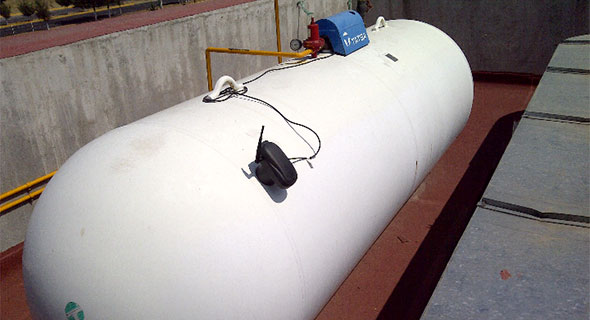What AT&T’s 2G network shutdown means for propane retailers

The takeaway: All 2G devices, from phones to tank monitors (regardless of the manufacturer), must be replaced because they will cease to communicate with a cell tower. Photo courtesy of SkyBitz Tank Monitoring
AT&T planned to shut down its 2G network at the end of 2016, a development for which propane tank monitoring providers had been preparing.
The network shutdown was ultimately precipitated by the increase in U.S. mobile data traffic, which, according to AT&T, grew by 75,000 percent from 2001 to 2006. Mobile data traffic on the AT&T national wireless network increased 150,000 percent in the nine years that followed, the company says, calling for a reallocation of capacity to more advanced wireless networks.
So, what does the shutdown mean for you, the propane retailer? LP Gas asked representatives from three tank monitoring companies to offer some perspective.
The representatives include Hank Smith, president and CEO of WESROC; Ken Stauffer, CEO and co-founder of Technology Assurance Labs; and Shawn Welsh, senior vice president of product line management and marketing at Telular Corp., parent company of SkyBitz Tank Monitoring.
LP Gas: What do propane retailers need to know about the expiration of AT&T’s 2G network?
Smith: WESROC has been communicating with customers for about three years that AT&T could take down its 2G cellular network. At the same time, we discontinued selling the 2G tank monitors in the U.S. and replaced them with newer technologies. However, it wasn’t until [2016] that AT&T categorically said when the 2G network would be discontinued.
Many 2G technologies quit working early because they were using a single frequency cellular channel. AT&T basically took down one of those frequencies, and many products could no longer report in important data like tank readings and security alarms. WESROC devices continued working in most cases because the WESROC technology used multiple cellular frequencies and could switch to a backup frequency if others were no longer available. The immediate issue now is that AT&T is taking down all 2G frequencies.
In addition, WESROC uses cellular technology that allows roaming to other cellular providers like T-Mobile. The vast majority of WESROC 2G devices will continue to function after AT&T removes its 2G service because our product can roam to other carriers.
So, the first thing a propane dealer needs to ask about any 2G cellular tank monitoring technology is will it roam to another carrier? If not, these devices will go dark soon. The bad thing for these propane retailers is that it is happening in the dead of winter, when most companies rely on monitors the most. And, there are several tank monitors out there that will not roam.
Stauffer: Originally, both Verizon and AT&T planned to turn off their 2G networks in 2017. Since then, Verizon has backed off until 2021, when it will turn off both 2G and 3G in favor of 4G. AT&T, however, will begin to shut down 2G markets in 2017. Propane dealers should have already determined if their existing radios are 2G radios and, if so, have a plan to swap them out to a 3G radio.
This constant need to upgrade the radios is a major disadvantage of cellular radios in general. Because neither the dealer nor the tank monitoring company has control of the data network, the service is at the mercy of the data provider. If AT&T or Verizon chooses to upgrade equipment or disable a feature, it can impact your service, forcing an upgrade of perfectly serviceable equipment.
One of the advantages of a fixed wireless system is that it doesn’t have to “chase the Gs.” Using an FCC-(Federal Communications Commission) licensed frequency ensures interference-free operations, stable and reliable radio hardware, and continuous availability of the network as long as the FCC license is maintained properly.
Fixed wireless also has an advantage over other non-cellular wireless technologies like WiFi, LoRa, SigFox and others. Those technologies are shared network bands and, as such, are subject to overloading, resulting in bandwidth contention and network congestion as more users begin using the network. Most current LoRa and SigFox systems are also being rolled out in cities, which doesn’t help the majority of rural propane dealers.
Welsh: Retailers who monitor their tanks – or are considering monitoring their tanks – need to understand that AT&T’s 2G GSM sunset is a cellular technology refresh that will render 2G devices, including tank monitors, regardless of the manufacturer, useless. The units will not communicate with the cell tower, and the data will simply stop flowing.
At SkyBitz Tank Monitoring, we’ve been proactively working with our customers for two years to ensure they have tank monitoring solutions that will last them well beyond the next technology sunset. Since a technology sunset can be costly to a company, we have put plans in place to make swapping monitoring devices as easy and cost-effective as possible. We even have a managed services program whereby customers pay nothing upfront for state-of-the-art equipment, and the program has a replacement clause offering protection from obsolescence should a future technology refresh be needed.
LP Gas: What’s next for retailers who have been using tank monitors affected by this change?
Smith: [It] depends on what type of technology their monitors use. If non-roaming, their monitors will soon quit reporting tank readings. For the long-term, partner with a monitoring company that leads the way on technology advancement.
How many of us thought a few years ago the most powerful computer we own would be a cellphone, small enough to carry in our shirt pocket and capable of multiple functions using the cellular network? Technology will continue to advance, and it is important to pick suppliers and products that keep up.
Welsh: All 2G GSM monitoring devices must be replaced with 3G/4G or CDMA (code division multiple access) technology. We encourage all propane retailers to reach out to their solution providers to discuss their options for replacing tank monitoring solutions. The ROI (return on investment) and benefits of tank monitoring can be realized very quickly, and propane retailers do not want to miss out on the monumental efficiencies this solution can offer.
















